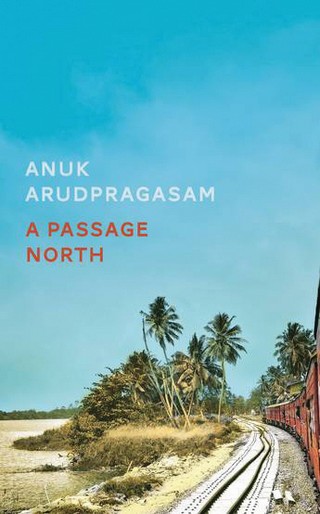A Passage North
Andrew: It is difficult to express the profound impact of A Passage North by Anuk Arudpragasam. It is the portrayal of a young man’s train trip to the north of Sri Lanka, to a small Tamil community, and his attendance at the funeral of an elderly woman who was a companion to his grandmother. The nature of the woman’s death, and the profound sadness of her life, touched horrendously by the country’s civil war, is the subject of Krishan’s reveries; and so the physical passage north coincides with a journey of memory and contemplation. Anuk Arudpragasam’s prose style is a bravura tightrope display—his sentences cascade with participial phrases (they take some getting used to)—but somehow manage the almost impossible, conveying the flux of the present at the same time as the stream of memory. I’m not sure it is a perfect novel; I fancy Arudpagasam’s prose style is an acquired taste, and for some sections of the novel I found it cloying and worked against the subject matter, but in many many parts is truly transcendental. It is definitely worth sticking with for the final chapter which is as gobsmackingly shattering and as beautiful as anything I’ve read.
Colm Toibin is one of my favourite authors and The Magician is an engaging pivot from his last few ‘chamber pieces’ to a big, bold, novel of the twentieth century and of the horrors of the rise of Nazism. Ostensibly it is akin to The Master, his acclaimed imagining of the life of Henry James. This time the subject is Thomas Mann and his large family; however it keeps much closer tabs on the known facts of Mann’s life, covers over half a century, and as such is a more straightforward ‘biographical novel’ than the James book. With the rise of Hitler, Mann’s horror and moral instinct is tempered again and again by a reticence to act on his beliefs and emotions—it is a powerful portrayal and he becomes almost a cipher, a perfect representative of a people hand-wringing and pearl-clutching their way towards moral destruction. It remains however a Toibin novel—its strongest scenes are not those of the public, historical figure but rather those where Toibin moves his magnifying glass slowly and steadily over the domestic tableau; examining the filigree of imagined conversations, sublimations, and disquieting observations.
The front cover of My Rock ‘n’ Roll Friend is a great ‘rock chick’ photograph of Lindy Morrison that Tracey Thorn has taken in a grungy dressing room somewhere in the 1980s. It has all of the allure, and the immediacy of a Nan Goldin photograph—but that very intimacy between subject and artist also has a real edge, reminding the viewer of how presumptuous we are to attempt to share in it or deign to understand it. My Rock ‘n’Roll Friend, however, proves itself a subtler, less intimidating, and more generous a piece of writing. It is a really engaging and lovely memoir of Thorn’s friendship with Morrison, the drummer from Australian band The Go-Betweens. Thorn is absolutely perfect for this task—as well as having one of the loveliest and most distinctive voices of her generation, in recent years she has pivoted from a certain degree of rock ‘fame’ to a charming and perspicacious journalism—and as such has about as clear-eyed and intelligent take on music, fame, and women as one could hope for. Sure, if you like the idea of a fly on the wall biog of a stroppy, outspoken, charismatic drummer living the rock dream, there is heaps to enjoy and you will tear through this in a couple of hours, but there is a far lovelier and subtler, examination of women in rock, celebrity, female friendship, career success and failure, the mutability of relationships, and much more in play. It is a really touching and revealing piece of writing.




